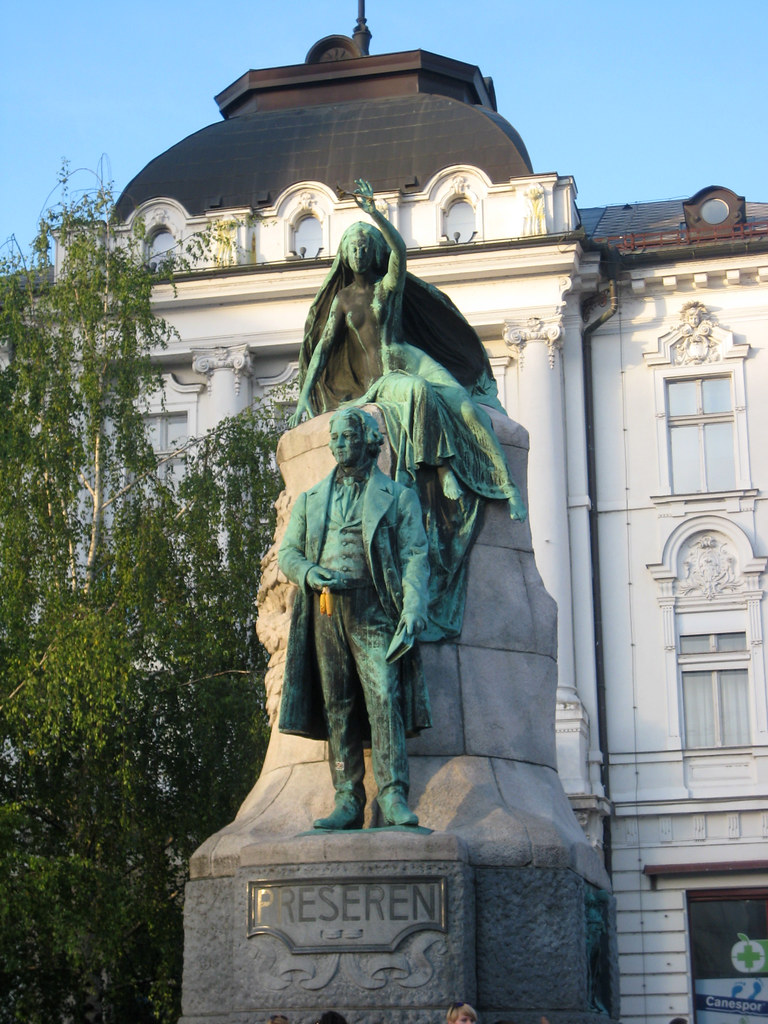Monday
I wrote recently about the significance of national literatures in the war between Russian and Ukraine (here and here). While many Russians regard the Ukrainian language with contempt—why read the “bullshit” of Ukrainian poet Shevchenko when you could be reading the Russian master poet Pushkin, the speaker in Joseph Brodsky’s “On Ukrainian Independence” says mockingly –a national poet like Shevchenko helps establish the credibility of the language and thereby the nation. That’s why the Ukrainian city of Karkhiv has a large statue of him in its central square, which is currently covered by sandbags to protect it against Russian missiles.
I saw how poetry can be entwined with nationalism at first hand when I spent two Fulbright years in Slovenia, once when it was one of Yugoslavia’s six republics (in 1987-88) and once when it was a newly independent country (in 1994-95). I remember being struck, when I visited the first time, by how many streets and buildings were named after Slovenian authors. Indeed, a statue of France Prešeren, Slovenia’s national poet, overlooks the downtown center of Ljubljana, Slovenia’s capital.
I write about Slovenia today because yesterday it, like much of Europe, celebrated Victory in Europe Day or VE Day. (Russia celebrates Victory Day today.) I got a close look at Slovenia’s regard for poetry when, in Slovenia’s 1995 VE celebration, I was one of six readers from five allied nations (along with a Slovenian teenager) chosen to read poems from their native lands. I enjoyed my 15 minutes of fame standing atop a 20-foot scaffold, where I read Walt Whitman’s “O Captain, My Captain” to a national television audience. I recount the story here so will just note the significance of the organizers choosing to conclude the celebration with poetry. Earlier, Slovenians had been treated to a performance by the national orchestra; to Slovenia’s famed mountain climbers scaling the nearby skyscrapers; to planes flying overhead; to Slovenian concentration camp survivors parading around; and to Slovenia’s famous white Lipizzaner horses being trotted through. Poetry, however, got the last word.
Looking at one of France Prešeren’s sonnets, one gets a sense of why he—and Slovenian writers generally—are so important to Slovenia’s sense of nationhood. Writing at a time (1834) when Slovenia was very much part of the Austro-Hungarian empire, Prešeren sees himself as a modern Orpheus. After all he, like the mythical Greek poet, lives in a mountainous country inhabited by “wild folk.” But if Slovenes are to go beyond regional infighting and see themselves as one people, they need a poet that will “speak with song of native strain” and “remind us of lost pride of race.” If such a poet does so, then
Our people in one nation then combined
Would see that feuds no longer did increase.
His strains would bring the rule of joy and peace,
Where tempests roar and nature is unkind.
Here’s the entire sonnet, which appeared in Wreath of Sonnets and has been translated by Vivian de Sola Pinto:
Above them savage peaks the mountains raise,
Like those which once were charmed by the refrain
Of Orpheus, when his lyre stirred hill and plain,
And Haemus’ crags and the wild folk of Thrace.Ah, would, to cure the dearth of these our days,
An Orpheus dowered with song of native strain
Were sent to us that all Slovenes might gain
Fresh fire to set their frozen hearts ablaze.His words might kindle thoughts that would remind
Us of lost pride of race; discord would cease;
Our people in one nation then combinedWould see that feuds no longer did increase.
His strains would bring the rule of joy and peace,
Where tempests roar and nature is unkind.
I believe the Slovenian dialect in which Prešeren wrote became the official language, just as Pushkin’s Russian became official Russian and Dante’s Italian official Italian. Chaucer, meanwhile, showed the English what could be accomplished by writing in London English.
The United States felt its own need for a national literature early in the 19th century. How can you be regarded as a legitimate nation unless you produce your own authors? (Hence the importance of figures like Nathaniel Hawthorne, Herman Melville, Ralph Waldo Emerson, and Walt Whitman to the young republic.) Nor must one be an emerging nation to use one’s authors for political purposes. Britain has sometimes wielded Shakespeare like a club, proof of its superiority, and France has done the same with Victor Hugo, Germany with Goethe, Italy with Dante, and Russia with Tolstoy.
I don’t approve of using literature in such a way since I think it detracts from what the authors are saying. When we idolize them (the worship of Shakespeare is called bardolatry) they become static and dead rather than dynamic and alive. It’s as though officialdom, by putting them on a pedestal, seeks us from getting too close. But at least we read them and, once we have done so, we can bridge that distance and develop our own intimate relations with them.


